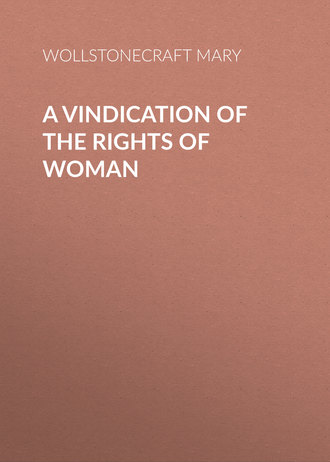 полная версия
полная версияA Vindication of the Rights of Woman
Is it then surprising, that when the sole ambition of woman centres in beauty, and interest gives vanity additional force, perpetual rivalships should ensue? They are all running the same race, and would rise above the virtue of mortals if they did not view each other with a suspicious and even envious eye.
An immoderate fondness for dress, for pleasure and for sway, are the passions of savages; the passions that occupy those uncivilized beings who have not yet extended the dominion of the mind, or even learned to think with the energy necessary to concatenate that abstract train of thought which produces principles. And that women, from their education and the present state of civilized life, are in the same condition, cannot, I think, be controverted. To laugh at them then, or satirize the follies of a being who is never to be allowed to act freely from the light of her own reason, is as absurd as cruel; for that they who are taught blindly to obey authority, will endeavour cunningly to elude it, is most natural and certain.
Yet let it be proved, that they ought to obey man implicitly, and I shall immediately agree that it is woman's duty to cultivate a fondness for dress, in order to please, and a propensity to cunning for her own preservation.
The virtues, however, which are supported by ignorance, must ever be wavering—the house built on sand could not endure a storm. It is almost unnecessary to draw the inference. If women are to be made virtuous by authority, which is a contradiction in terms, let them be immured in seraglios and watched with a jealous eye. Fear not that the iron will enter into their souls—for the souls that can bear such treatment are made of yielding materials, just animated enough to give life to the body.
"Matter too soft a lasting mark to bear,And best distinguish'd by black, brown, or fair."The most cruel wounds will of course soon heal, and they may still people the world, and dress to please man—all the purposes which certain celebrated writers have allowed that they were created to fill.
SECTION 13.4
Women are supposed to possess more sensibility, and even humanity, than men, and their strong attachments and instantaneous emotions of compassion are given as proofs; but the clinging affection of ignorance has seldom any thing noble in it, and may mostly be resolved into selfishness, as well as the affection of children and brutes. I have known many weak women whose sensibility was entirely engrossed by their husbands; and as for their humanity, it was very faint indeed, or rather it was only a transient emotion of compassion, "Humanity does not consist in a squeamish ear," says an eminent orator. "It belongs to the mind as well as the nerves."
But this kind of exclusive affection, though it degrade the individual, should not be brought forward as a proof of the inferiority of the sex, because it is the natural consequence of confined views: for even women of superior sense, having their attention turned to little employments, and private plans, rarely rise to heroism, unless when spurred on by love; and love as an heroic passion, like genius, appears but once in an age. I therefore agree with the moralist who asserts, "that women have seldom so much generosity as men;" and that their narrow affections, to which justice and humanity are often sacrificed, render the sex apparently inferior, especially as they are commonly inspired by men; but I contend, that the heart would expand as the understanding gained strength, if women were not depressed from their cradles.
I know that a little sensibility and great weakness will produce a strong sexual attachment, and that reason must cement friendship; consequently I allow, that more friendship is to be found in the male than the female world, and that men have a higher sense of justice. The exclusive affections of women seem indeed to resemble Cato's most unjust love for his country. He wished to crush Carthage, not to save Rome, but to promote its vain glory; and in general, it is to similar principles that humanity is sacrificed, for genuine duties support each other.
Besides, how can women be just or generous, when they are the slaves of injustice.
SECTION 13.5
As the rearing of children, that is, the laying a foundation of sound health both of body and mind in the rising generation, has justly been insisted on as the peculiar destination of woman, the ignorance that incapacitates them must be contrary to the order of things. And I contend, that their minds can take in much more, and ought to do so, or they will never become sensible mothers. Many men attend to the breeding of horses, and overlook the management of the stable, who would, strange want of sense and feeling! think themselves degraded by paying any attention to the nursery; yet, how many children are absolutely murdered by the ignorance of women! But when they escape, and are neither destroyed by unnatural negligence nor blind fondness, how few are managed properly with respect to the infant mind! So that to break the spirit, allowed to become vicious at home, a child is sent to school; and the methods taken there, which must be taken to keep a number of children in order, scatter the seeds of almost every vice in the soil thus forcibly torn up.
I have sometimes compared the struggles of these poor children who ought never to have felt restraint, nor would, had they been always held in with an even hand, to the despairing plunges of a spirited filly, which I have seen breaking on a strand; its feet sinking deeper and deeper in the sand every time it endeavoured to throw its rider, till at last it sullenly submitted.
I have always found horses, an animal I am attached to, very tractable when treated with humanity and steadiness, so that I doubt whether the violent methods taken to break them, do not essentially injure them; I am, however, certain that a child should never be thus forcibly tamed after it has injudiciously been allowed to run wild; for every violation of justice and reason, in the treatment of children, weakens their reason. And, so early do they catch a character, that the base of the moral character, experience leads me to infer, is fixed before their seventh year, the period during which women are allowed the sole management of children. Afterwards it too often happens that half the business of education is to correct, and very imperfectly is it done, if done hastily, the faults, which they would never have acquired if their mothers had had more understanding.
One striking instance of the folly of women must not be omitted. The manner in which they treat servants in the presence of children, permitting them to suppose, that they ought to wait on them, and bear their humours. A child should always be made to receive assistance from a man or woman as a favour; and, as the first lesson of independence, they should practically be taught, by the example of their mother, not to require that personal attendance which it is an insult to humanity to require, when in health; and instead of being led to assume airs of consequence, a sense of their own weakness should first make them feel the natural equality of man. Yet, how frequently have I indignantly heard servants imperiously called to put children to bed, and sent away again and again, because master or miss hung about mamma, to stay a little longer. Thus made slavishly to attend the little idol, all those most disgusting humours were exhibited which characterize a spoiled child.
In short, speaking of the majority of mothers, they leave their children entirely to the care of servants: or, because they are their children, treat them as if they were little demi-gods, though I have always observed, that the women who thus idolize their children, seldom show common humanity to servants, or feel the least tenderness for any children but their own.
It is, however, these exclusive affections, and an individual manner of seeing things, produced by ignorance, which keep women for ever at a stand, with respect to improvement, and make many of them dedicate their lives to their children only to weaken their bodies and spoil their tempers, frustrating also any plan of education that a more rational father may adopt; for unless a mother concurs, the father who restrains will ever be considered as a tyrant.
But, fulfilling the duties of a mother, a woman with a sound constitution, may still keep her person scrupulously neat, and assist to maintain her family, if necessary, or by reading and conversations with both sexes, indiscriminately, improve her mind. For nature has so wisely ordered things, that did women suckle their children, they would preserve their own health, and there would be such an interval between the birth of each child, that we should seldom see a house full of babes. And did they pursue a plan of conduct, and not waste their time in following the fashionable vagaries of dress, the management of their household and children need not shut them out from literature, nor prevent their attaching themselves to a science, with that steady eye which strengthens the mind, or practising one of the fine arts that cultivate the taste.
But, visiting to display finery, card playing, and balls, not to mention the idle bustle of morning trifling, draw women from their duty, to render them insignificant, to render them pleasing, according to the present acceptation of the word, to every man, but their husband. For a round of pleasures in which the affections are not exercised, cannot be said to improve the understanding, though it be erroneously called seeing the world; yet the heart is rendered cold and averse to duty, by such a senseless intercourse, which becomes necessary from habit, even when it has ceased to amuse.
But, till more equality be established in society, till ranks are confounded and women freed, we shall not see that dignified domestic happiness, the simple grandeur of which cannot be relished by ignorant or vitiated minds; nor will the important task of education ever be properly begun till the person of a woman is no longer preferred to her mind. For it would be as wise to expect corn from tares, or figs from thistles, as that a foolish ignorant woman should be a good mother.
SECTION 13.6
It is not necessary to inform the sagacious reader, now I enter on my concluding reflections, that the discussion of this subject merely consists in opening a few simple principles, and clearing away the rubbish which obscured them. But, as all readers are not sagacious, I must be allowed to add some explanatory remarks to bring the subject home to reason—to that sluggish reason, which supinely takes opinions on trust, and obstinately supports them to spare itself the labour of thinking.
Moralists have unanimously agreed, that unless virtue be nursed by liberty, it will never attain due strength—and what they say of man I extend to mankind, insisting, that in all cases morals must be fixed on immutable principles; and that the being cannot be termed rational or virtuous, who obeys any authority but that of reason.
To render women truly useful members of society, I argue, that they should be led, by having their understandings cultivated on a large scale, to acquire a rational affection for their country, founded on knowledge, because it is obvious, that we are little interested about what we do not understand. And to render this general knowledge of due importance, I have endeavoured to show that private duties are never properly fulfilled, unless the understanding enlarges the heart; and that public virtue is only an aggregate of private. But, the distinctions established in society undermine both, by beating out the solid gold of virtue, till it becomes only the tinsel-covering of vice; for, whilst wealth renders a man more respectable than virtue, wealth will be sought before virtue; and, whilst women's persons are caressed, when a childish simper shows an absence of mind—the mind will lie fallow. Yet, true voluptuousness must proceed from the mind—for what can equal the sensations produced by mutual affection, supported by mutual respect? What are the cold or feverish caresses of appetite, but sin embracing death, compared with the modest overflowings of a pure heart and exalted imagination? Yes, let me tell the libertine of fancy when he despises understanding in woman—that the mind, which he disregards, gives life to the enthusiastic affection from which rapture, short-lived as it is, alone can flow! And, that, without virtue, a sexual attachment must expire, like a tallow candle in the socket, creating intolerable disgust. To prove this, I need only observe, that men who have wasted great part of their lives with women, and with whom they have sought for pleasure with eager thirst, entertain the meanest opinion of the sex. Virtue, true refiner of joy! if foolish men were to fright thee from earth, in order to give loose to all their appetites without a check—some sensual wight of taste would scale the heavens to invite thee back, to give a zest to pleasure!
That women at present are by ignorance rendered foolish or vicious, is, I think, not to be disputed; and, that the most salutary effects tending to improve mankind, might be expected from a REVOLUTION in female manners, appears at least, with a face of probability, to rise out of the observation. For as marriage has been termed the parent of those endearing charities, which draw man from the brutal herd, the corrupting intercourse that wealth, idleness, and folly produce between the sexes, is more universally injurious to morality, than all the other vices of mankind collectively considered. To adulterous lust the most sacred duties are sacrificed, because, before marriage, men, by a promiscuous intimacy with women, learned to consider love as a selfish gratification—learned to separate it not only from esteem, but from the affection merely built on habit, which mixes a little humanity with it. Justice and friendship are also set at defiance, and that purity of taste is vitiated, which would naturally lead a man to relish an artless display of affection, rather than affected airs. But that noble simplicity of affection, which dares to appear unadorned, has few attractions for the libertine, though it be the charm, which, by cementing the matrimonial tie, secures to the pledges of a warmer passion the necessary parental attention; for children will never be properly educated till friendship subsists between parents. Virtue flies from a house divided against itself—and a whole legion of devils take up their residence there.
The affection of husbands and wives cannot be pure when they have so few sentiments in common, and when so little confidence is established at home, as must be the case when their pursuits are so different. That intimacy from which tenderness should flow, will not, cannot subsist between the vicious.
Contending, therefore, that the sexual distinction, which men have so warmly insisted upon, is arbitrary, I have dwelt on an observation, that several sensible men, with whom I have conversed on the subject, allowed to be well founded; and it is simply this, that the little chastity to be found amongst men, and consequent disregard of modesty, tend to degrade both sexes; and further, that the modesty of women, characterized as such, will often be only the artful veil of wantonness, instead of being the natural reflection of purity, till modesty be universally respected.
>From the tyranny of man, I firmly believe, the greater number of female follies proceed; and the cunning, which I allow, makes at present a part of their character, I likewise have repeatedly endeavoured to prove, is produced by oppression. Were not dissenters, for instance, a class of people, with strict truth characterized as cunning? And may I not lay some stress on this fact to prove, that when any power but reason curbs the free spirit of man, dissimulation is practised, and the various shifts of art are naturally called forth? Great attention to decorum, which was carried to a degree of scrupulosity, and all that puerile bustle about trifles and consequential solemnity, which Butler's caricature of a dissenter brings before the imagination, shaped their persons as well as their minds in the mould of prim littleness. I speak collectively, for I know how many ornaments to human nature have been enrolled amongst sectaries; yet, I assert, that the same narrow prejudice for their sect, which women have for their families, prevailed in the dissenting part of the community, however worthy in other respects; and also that the same timid prudence, or headstrong efforts, often disgraced the exertions of both. Oppression thus formed many of the features of their character perfectly to coincide with that of the oppressed half of mankind; for is it not notorious, that dissenters were like women, fond of deliberating together, and asking advice of each other, till by a complication of little contrivances, some little end was brought about? A similar attention to preserve their reputation was conspicuous in the dissenting and female world, and was produced by a similar cause.
Asserting the rights which women in common with men ought to contend for, I have not attempted to extenuate their faults; but to prove them to be the natural consequence of their education and station in society. If so, it is reasonable to suppose, that they will change their character, and correct their vices and follies, when they are allowed to be free in a physical, moral, and civil sense.
Let woman share the rights, and she will emulate the virtues of man; for she must grow more perfect when emancipated, or justify the authority that chains such a weak being to her duty. If the latter, it will be expedient to open a fresh trade with Russia for whips; a present which a father should always make to his son-in-law on his wedding day, that a husband may keep his whole family in order by the same means; and without any violation of justice reign, wielding this sceptre, sole master of his house, because he is the only being in it who has reason; the divine, indefeasible, earthly sovereignty breathed into man by the Master of the universe. Allowing this position, women have not any inherent rights to claim; and, by the same rule their duties vanish, for rights and duties are inseparable.
Be just then, O ye men of understanding! and mark not more severely what women do amiss, than the vicious tricks of the horse or the ass for whom ye provide provender, and allow her the privileges of ignorance, to whom ye deny the rights of reason, or ye will be worse than Egyptian task-masters, expecting virtue where nature has not given understanding!
1
Men of abilities scatter seeds that grow up, and have a great influence on the forming opinion; and when once the public opinion preponderates, through the exertion of reason, the overthrow of arbitrary power is not very distant.
2
What is to be the consequence, if the mother's and husband's opinion should chance not to agree? An ignorant person cannot be reasoned out of an error, and when persuaded to give up one prejudice for another the mind is unsettled. Indeed, the husband may not have any religion to teach her though in such a situation she will be in great want of a support to her virtue, independent of worldly considerations.
3
Can you?—Can you? would be the most emphatical comment, were it drawled out in a whining voice.
4
Let women once acquire good sense—and if it deserve the name, it will teach them; or, of what use will it be how to employ it.
5
"He is the free man, whom TRUTH makes free!" Cowper.
6
I mean to use a word that comprehends more than chastity, the sexual virtue.
7
A person is not to act in this or that way, though convinced they are right in so doing, because some equivocal circumstances may lead the world to SUSPECT that they acted from different motives. This is sacrificing the substance for a shadow. Let people but watch their own hearts, and act rightly as far as they can judge, and they may patiently wait till the opinion of the world comes round. It is best to be directed by a simple motive—for justice has too often been sacrificed to propriety;—another word for convenience.
8
See an excellent essay on this subject by Mrs. Barbauld, in Miscellaneous pieces in Prose.
9
I have sometimes, when inclined to laugh at materialists, asked whether, as the most powerful effects in nature are apparently produced by fluids, the magnetic, etc. the passions might not be fine volatile fluids that embraced humanity, keeping the more refractory elementary parts together—or whether they were simply a liquid fire that pervaded the more sluggish materials giving them life and heat?
10
"Such is the country-maiden's fright,When first a red-coat is in sight;Behind the door she hides her face,Next time at distance eyes the lace:She now can all his terrors stand,Nor from his squeeze withdraws her hand,She plays familiar in his arms,And every soldier hath his charms;>From tent to tent she spreads her flame;For custom conquers fear and shame."11
Modesty, is the graceful calm virtue of maturity; bashfulness, the charm of vivacious youth.
12
The poor moth fluttering round a candle, burns its wings.
13
I remember to have met with a sentence, in a book of education that made me smile. "It would be needless to caution you against putting your hand, by chance, under your neck-handkerchief; for a modest woman never did so!"
14
The behaviour of many newly married women has often disgusted me. They seem anxious never to let their husbands forget the privilege of marriage, and to find no pleasure in his society unless he is acting the lover. Short, indeed, must be the reign of love, when the flame is thus constantly blown up, without its receiving any solid fuel.
15
I allude to various biographical writings, but particularly to Boswell's Life of Johnson.
16
Treating this part of the subject, I have borrowed some hints from a very sensible pamphlet written by the late bishop of Autun on public Education.
17
I am not now alluding to that superiority of mind which leads to the creation of ideal beauty, when life surveyed with a penetrating eye, appears a tragi-comedy, in which little can be seen to satisfy the heart without the help of fancy.
*
A respectable old man gives the following sensible account of the method he pursued when educating his daughter. "I endeavoured to give both to her mind and body a degree of vigour, which is seldom found in the female sex. As soon as she was sufficiently advanced in strength to be capable of the lighter labours of husbandry and gardening, I employed her as my constant companion. Selene, for that was her name, soon acquired a dexterity in all these rustic employments which I considered with equal pleasure and admiration. If women are in general feeble both in body and mind, it arises less from nature than from education. We encourage a vicious indolence and inactivity, which we falsely call delicacy; instead of hardening their minds by the severer principles of reason and philosophy, we breed them to useless arts, which terminate in vanity and sensuality. In most of the countries which I had visited, they are taught nothing of an higher nature than a few modulations of the voice, or useless postures of the body; their time is consumed in sloth or trifles, and trifles become the only pursuits capable of interesting them. We seem to forget, that it is upon the qualities of the female sex, that our own domestic comforts and the education of our children must depend. And what are the comforts or the education which a race of beings corrupted from their infancy, and unacquainted with all the duties of life, are fitted to bestow? To touch a musical instrument with useless skill, to exhibit their natural or affected graces, to the eyes of indolent and debauched young men, who dissipate their husbands' patrimony in riotous and unnecessary expenses: these are the only arts cultivated by women in most of the polished nations I had seen. And the consequences are uniformly such as may be expected to proceed from such polluted sources, private misery, and public servitude.






